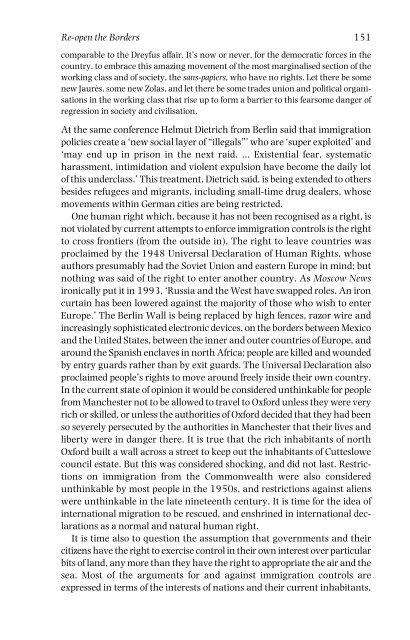Open%20borders%20The%20case%20against%20immigration%20controls%20-%20Teresa%20Hayter
Open%20borders%20The%20case%20against%20immigration%20controls%20-%20Teresa%20Hayter
Open%20borders%20The%20case%20against%20immigration%20controls%20-%20Teresa%20Hayter
You also want an ePaper? Increase the reach of your titles
YUMPU automatically turns print PDFs into web optimized ePapers that Google loves.
Re-open the Borders 151<br />
comparable to the Dreyfus affair. It’s now or never, for the democratic forces in the<br />
country, to embrace this amazing movement of the most marginalised section of the<br />
working class and of society, the sans-papiers, who have no rights. Let there be some<br />
new Jaurès, some new Zolas, and let there be some trades union and political organisations<br />
in the working class that rise up to form a barrier to this fearsome danger of<br />
regression in society and civilisation.<br />
At the same conference Helmut Dietrich from Berlin said that immigration<br />
policies create a ‘new social layer of “illegals”’ who are ‘super exploited’ and<br />
‘may end up in prison in the next raid. ... Existential fear, systematic<br />
harassment, intimidation and violent expulsion have become the daily lot<br />
of this underclass.’ This treatment, Dietrich said, is being extended to others<br />
besides refugees and migrants, including small-time drug dealers, whose<br />
movements within German cities are being restricted.<br />
One human right which, because it has not been recognised as a right, is<br />
not violated by current attempts to enforce immigration controls is the right<br />
to cross frontiers (from the outside in). The right to leave countries was<br />
proclaimed by the 1948 Universal Declaration of Human Rights, whose<br />
authors presumably had the Soviet Union and eastern Europe in mind; but<br />
nothing was said of the right to enter another country. As Moscow News<br />
ironically put it in 1993, ‘Russia and the West have swapped roles. An iron<br />
curtain has been lowered against the majority of those who wish to enter<br />
Europe.’ The Berlin Wall is being replaced by high fences, razor wire and<br />
increasingly sophisticated electronic devices, on the borders between Mexico<br />
and the United States, between the inner and outer countries of Europe, and<br />
around the Spanish enclaves in north Africa; people are killed and wounded<br />
by entry guards rather than by exit guards. The Universal Declaration also<br />
proclaimed people’s rights to move around freely inside their own country.<br />
In the current state of opinion it would be considered unthinkable for people<br />
from Manchester not to be allowed to travel to Oxford unless they were very<br />
rich or skilled, or unless the authorities of Oxford decided that they had been<br />
so severely persecuted by the authorities in Manchester that their lives and<br />
liberty were in danger there. It is true that the rich inhabitants of north<br />
Oxford built a wall across a street to keep out the inhabitants of Cutteslowe<br />
council estate. But this was considered shocking, and did not last. Restrictions<br />
on immigration from the Commonwealth were also considered<br />
unthinkable by most people in the 1950s, and restrictions against aliens<br />
were unthinkable in the late nineteenth century. It is time for the idea of<br />
international migration to be rescued, and enshrined in international declarations<br />
as a normal and natural human right.<br />
It is time also to question the assumption that governments and their<br />
citizens have the right to exercise control in their own interest over particular<br />
bits of land, any more than they have the right to appropriate the air and the<br />
sea. Most of the arguments for and against immigration controls are<br />
expressed in terms of the interests of nations and their current inhabitants,


